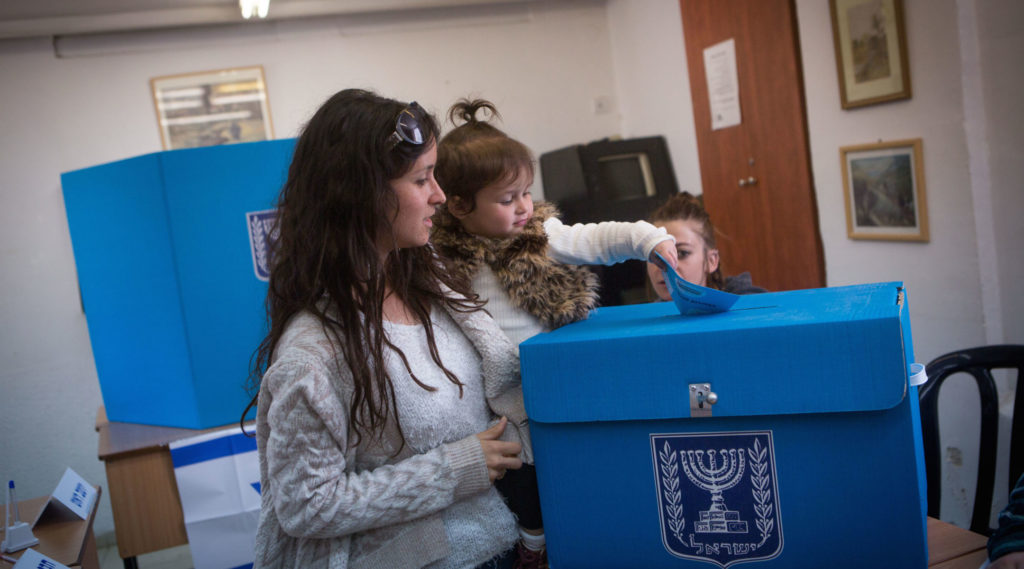Australia/Israel Review, Featured
Editorial: Democracy in Israel, Diplomacy in Washington
Sep 25, 2019 | Colin Rubenstein

While the make up of Israel’s next government remains unclear, what was striking in the aftermath of the Sept. 17 election is that Israel’s democracy remains alive and feisty.
Firstly, despite an unprecedented second election within five months and widespread predictions of high voter apathy, voter turnout increased 2% from April’s poll to around 69%.
Secondly, Arab-Israelis showed their desire to participate in Israel’s democratic process. Bouncing back from a low turnout in April, approximately 10% more Arab Israelis voted this time around.
Moreover, highlighting the absurdity of critics alleging “apartheid” in Israel, the Arab-dominated Joint List now holds the third-highest number of seats in the Knesset (13, up from 10), is an active participant in the horse trading to form a new government, and its head, Ayman Odeh, may possibly become the country’s official opposition leader.
Thirdly, ultra-nationalist party Otzma Yehudit, followers of the late extremist Rabbi Meir Kahane, again failed to win any seats – a welcome outcome for a party whose extremism and racism deserve no place in the Israeli mainstream.
Meanwhile, the results – Blue and White winning 33 seats, Likud with 31 – have seen most commentators agree that a national unity government is the most likely outcome of the coalition negotiations which follow any Israeli election. This may also be a good outcome.
Unity governments have frequently governed Israel in the past and the results have been mixed. Some broad-based coalition governments have become virtually paralysed by infighting. However, unity governments have also served Israel well at times of grave national challenge, such as during the Six Day War in 1967, or the hyper-inflation crisis of the mid-1980s.
Today, there are grave and persistent security threats to Israel from the north and Gaza – all of which derive from Iran and its local proxies. While these threats are not new, there is good reason to believe that they are reaching a critical turning point – suggesting that a united government reaching across the political spectrum might be the best way for Israel to confront these challenges.
With respect to Hamas-ruled Gaza, it is generally agreed that the current destabilising situation of regular rocket fire and incendiary attacks cannot continue indefinitely. However, what is happening in the north is even more dangerous. There, Israel has two key strategic objectives that are critical for its long-term security – preventing Iran from creating an extensive and permanent military presence in Syria, and stopping the “missile precision” project in Lebanon whereby Iran is seeking to arm its key proxy Hezbollah with very dangerous precision-guided missile technology on a large-scale.
It was these two Israeli strategic imperatives – supported virtually across the political spectrum in Israel – that were behind August’s major escalation between Israel and Hezbollah in Lebanon and Syria.
Hezbollah promised fire and brimstone in response but in reality limited its retaliation to a brief border skirmish. Israel is going to have to keep degrading Hezbollah’s precision missile-building infrastructure and at some point, a major escalation is likely.
In facing that reality, a government of national unity – able to represent all Israelis and carefully consider all views and options – would be helpful.
Meanwhile, the escalation in Lebanon and Syria comes in the context of the international crisis caused by increasingly dangerous Iranian behaviour in the Persian Gulf – which looks set to come to a head sometime soon.
The crippling military strike on Saudi Arabia’s most important oil processing facility on Sept. 14 was a shockingly audacious escalation in Iran’s ongoing efforts to threaten the world oil market in order to challenge US sanctions – which have been highly successful in shutting down Iran’s oil exports and squeezing the Iranian economy.
The latest attack follows repeated Iranian strikes on commercial shipping vessels, the shooting down of a US drone and blatant breaches of the Joint Comprehensive Plan of Action (JCPOA) nuclear deal signed in 2015.
If this crisis does come to a head, or ends in military action, there is a very good chance Iran and/or its proxies will launch aggressive action against Israel, and Israel needs to be prepared for this eventuality.
Meanwhile, Australia is also dealing with the current crisis caused by Iran’s increasingly reckless rogue behaviour and protecting its own national interests in ensuring both the safe flow of energy and freedom of navigation.
At this critical time, Australian Prime Minister Scott Morrison was welcomed at a White House State Dinner hosted by US President Donald Trump and praised for Australia’s decision to join the maritime coalition protecting shipping in the Strait of Hormuz.
Yet while commending Trump for his restraint on Iran, Morrison, like others, including the US itself, needs to consider what level and type of pressure is required to cajole Iran back to the negotiating table.
Back in December, Morrison flagged his Government might be prepared to consider increased autonomous sanctions against Teheran, while Foreign Minister Marise Payne said in May that Australia supports the JCPOA nuclear deal “as long as Iran remained in compliance with its provisions.” Iran now admits that it is openly breaching the deal.
Moreover, there are now increased complications caused by the fact that at least four Australian citizens have been imprisoned or detained in Iran on trumped-up charges.
Morrison has taken a principled approach to Iran and astutely understands the threat Iran poses to its own people, to its region and to broader global security which he would have reviewed in his talks with the Trump Administration.
Iran is showing no willingness to return to negotiations for a more comprehensive deal at this stage, the US Administration’s undoubted objective. Morrison, like the future Israeli Government and the US itself, all have significant decisions looming about how to best confront the escalating Iranian threats and convince an increasingly belligerent Teheran to return to the negotiating table, as the US seeks.






